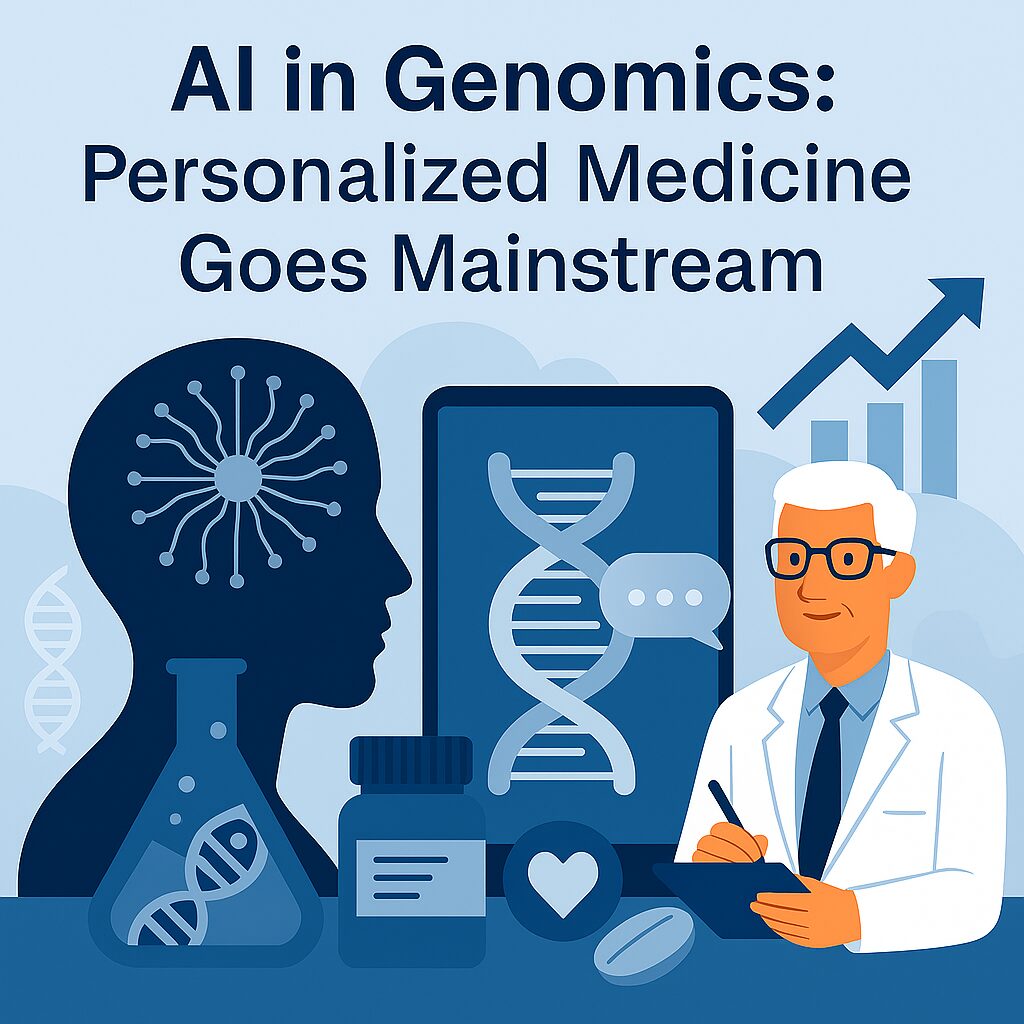Introduction
In 2025, the fusion of artificial intelligence (AI) and genomics is no longer a futuristic concept—it’s a clinical reality. Personalized medicine, once reserved for rare diseases and elite research labs, is now entering mainstream healthcare. Thanks to AI’s ability to decode complex genetic data, treatments are becoming more precise, predictive, and personalized than ever before.
🔍 What Is AI-Driven Genomics?
AI in genomics refers to the use of machine learning algorithms and deep learning models to analyze vast genomic datasets. These systems can:
- Identify disease-causing mutations
- Predict drug responses based on genetic profiles
- Discover novel therapeutic targets
- Generate synthetic genomic data for rare conditions
Tools like DeepVariant, AlphaFold, and GENTRL are revolutionizing how we interpret DNA and design treatments.
🚀 How Personalized Medicine Is Going Mainstream
✅ Real-Time Genomic Analysis
AI can process billions of DNA base pairs in minutes, enabling rapid diagnosis and treatment planning.
✅ Pharmacogenomics Integration
AI predicts how patients will respond to medications based on their genetic makeup, reducing adverse reactions and improving efficacy.
✅ AI-Powered Clinical Trials
Algorithms match patients to trials based on genomic compatibility, accelerating drug development and improving outcomes.
✅ Preventive Care & Risk Prediction
AI models forecast disease risks—like cancer, diabetes, or cardiovascular conditions—years before symptoms appear.
📊 Traditional vs. AI-Enhanced Genomic Medicine
| Feature | Traditional Genomics | AI-Driven Genomics |
|---|---|---|
| Data Processing Speed | Weeks to months | Minutes to hours |
| Diagnostic Accuracy | Moderate | High with deep learning models |
| Accessibility | Limited to specialists | Available via cloud platforms |
| Cost | High | Decreasing with automation |
🌍 Global Adoption in 2025
- UK Biobank and BioBank Japan are fueling AI research with massive genomic datasets
- Color Genomics offers AI-powered lifestyle recommendations based on DNA
- CRISPR-AI platforms are designing gene therapies tailored to individual mutations
- Hospitals and insurers now integrate AI-genomics into routine care and coverage
⚠️ Challenges and Ethical Considerations
Despite its promise, AI in genomics faces hurdles:
- Data Privacy: Genomic data is deeply personal and must be protected
- Bias in Training Data: Lack of diversity can lead to inaccurate predictions
- Interpretability: Black-box models must be explainable for clinical use
- Equity: Access to personalized medicine must be inclusive and affordable
📈 SEO Tips for Genomics Content Creators
✅ Search-Friendly Titles
- “AI in Genomics: Personalized Medicine Goes Mainstream”
- “How Artificial Intelligence Is Transforming DNA-Based Healthcare”
✅ High-Impact Keywords
- “AI genomics 2025”
- “personalized medicine with machine learning”
- “genomic data analysis tools”
✅ Metadata Optimization
- Alt Text: “AI system analyzing human genome for personalized treatment”
- Tags: #GenomicsAI #PrecisionMedicine2025 #AIHealthcare #DNAAnalysis #PersonalizedTherapy
Conclusion
AI in genomics is not just a technological upgrade—it’s a paradigm shift. By unlocking the secrets of our DNA, algorithms are enabling a future where medicine is tailored, timely, and transformative. As personalized medicine goes mainstream, the question isn’t if AI will change healthcare—it’s how fast.
💬 Want help crafting SEO-rich content on biotech, ethical AI, or genomic storytelling? I’d love to collaborate—your narrative instincts plus my data fluency could make a powerful impact.

